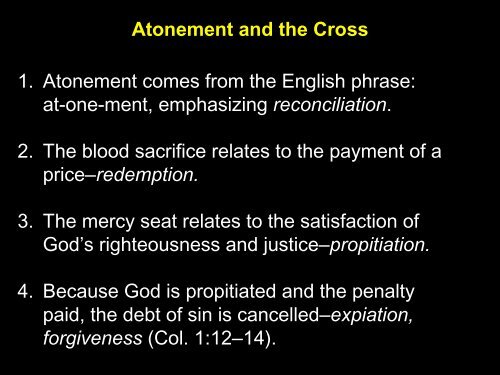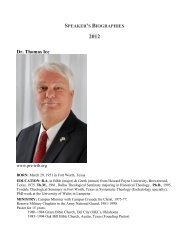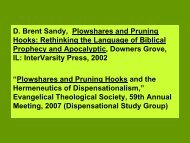Hebrews-144 - Dean Bible Ministries
Hebrews-144 - Dean Bible Ministries
Hebrews-144 - Dean Bible Ministries
Create successful ePaper yourself
Turn your PDF publications into a flip-book with our unique Google optimized e-Paper software.
Atonement and the Cross<br />
1. Atonement comes from the English phrase:<br />
at-one-ment, emphasizing reconciliation.<br />
2. The blood sacrifice relates to the payment of a<br />
price–redemption.<br />
3. The mercy seat relates to the satisfaction of<br />
God’s righteousness and justice–propitiation.<br />
4. Because God is propitiated and the penalty<br />
paid, the debt of sin is cancelled–expiation,<br />
forgiveness (Col. 1:12–14).
Atonement is a multifaceted concept that<br />
relates to redemption, forgiveness, expiation,<br />
and propitiation.
FORGIVENESS<br />
REDEMPTION<br />
ATONEMENT<br />
kaphar<br />
EXPIATION<br />
RECONCILIATION<br />
PROPITIATION
Col. 1:13, “He has delivered us from the power<br />
of darkness and conveyed us into the kingdom<br />
of the Son of His love,<br />
Col. 1:14, “in whom we have redemption<br />
through His blood, the forgiveness of sins.”
Col. 1:19, “For it pleased the Father that in Him<br />
all the fullness should dwell,<br />
Col. 1:20, “and by Him to reconcile all things to<br />
Himself, by Him, whether things on earth or<br />
things in heaven, having made peace through<br />
the blood of His cross.
Col. 1:21, “And you, who once were alienated<br />
and enemies in your mind by wicked works, yet<br />
now He has reconciled<br />
Col. 1:22, “in the body of His flesh through<br />
death, to present you holy, and blameless, and<br />
above reproach in His sight” —<br />
Including sin offering and the golden altar
Col. 2:13, “And you, being dead in your<br />
trespasses and the uncircumcision of your<br />
flesh, He has made alive together with Him,<br />
having forgiven you all trespasses,<br />
Col. 2:14, “having wiped out the handwriting of<br />
requirements that was against us, which was<br />
contrary to us. And He has taken it out of the<br />
way, having nailed it to the cross.”<br />
When you were dead in your transgressions<br />
(substantival)
Rom. 3:25, “whom God displayed publicly as a<br />
propitiation in His blood [en to haimati] through faith.<br />
This was to demonstrate His righteousness, because<br />
in the forbearance of God He passed over the sins<br />
previously committed;”<br />
Rom. 5:9, “Much more then, having now been<br />
justified by His blood [en to haimati], we shall be<br />
saved from the wrath of God through Him.”
1 Pet. 1:2, “according to the foreknowledge of God<br />
the Father, by the sanctifying work of the Spirit, that<br />
you may obey Jesus Christ and be sprinkled with His<br />
blood: May grace and peace be yours in fullest<br />
measure.”
1 Pet. 1:18, “knowing that you were not redeemed<br />
with perishable things like silver or gold from your<br />
futile way of life inherited from your forefathers,<br />
1 Pet. 1:19, “but with precious blood, as of a lamb<br />
unblemished and spotless, the blood of Christ.”
Metonymy is a figure by which one name or<br />
noun is used instead of another, to which it<br />
stands in a certain relation.<br />
The change is in the noun, and only in a verb<br />
as connected with the action proceeding from<br />
it.<br />
(Ethelbert William Bullinger, Figures of Speech)
Synechdoché<br />
A synecdoché is the exchange of one idea for<br />
another associated idea.<br />
The difference between Metonymy and<br />
Synecdoché lies in this; that in Metonymy, the<br />
exchange is made between two related nouns;<br />
while in Synecdoché, the exchange is made<br />
between two associated ideas.
In the New Testament, the expression “the<br />
blood of Christ” is the figure Metalepsis;<br />
because first the “blood” is put (by<br />
Synecdoché [related ideas]) for bloodshedding:<br />
i.e., the death of Christ, as distinct<br />
from His life; and then His death is put for the<br />
perfect satisfaction made by it [phys death for<br />
spiritual death—noun for related noun], for all<br />
the merits of the atonement effected by it: i.e.,<br />
it means not merely the actual blood<br />
corpuscles, neither does it mean His death as<br />
an act, but the merits of the atonement effected<br />
by it and associated with it.<br />
(EB, Figures)
All such expressions are contrary to<br />
physiology and common sense.<br />
We lose nothing of the facts, but gain<br />
immensely as to their meaning, when we<br />
understand that, by Metalepsis, “blood” is put<br />
for death, and “death” for the atonement made<br />
by it and all its infinite merits.<br />
In like manner “the Cross” is put first for the<br />
crucifixion as an act, or for Him who was<br />
crucified thereon: and then this is put for the<br />
resulting merits of His atonements procured<br />
thereby.
Heb. 9:6, “Now when these things had been<br />
thus prepared, the priests always went into the<br />
first part of the tabernacle, performing the<br />
services.
Heb. 9:7, “But into the second part the high<br />
priest went alone once a year, not without<br />
blood, which he offered for himself and for the<br />
people’s sins committed in ignorance;
Heb. 9:8, “The Holy Spirit is signifying this, that<br />
the way into the holy place has not yet been<br />
disclosed, while the outer tabernacle is still<br />
standing,”
The Doctrine of Progressive Revelation<br />
1. God did not reveal all of his plan at one time<br />
or to one individual.<br />
2 Pet. 3:15, “and consider that the longsuffering of<br />
our Lord is salvation—as also our beloved brother<br />
Paul, according to the wisdom given to him, has<br />
written to you,<br />
2 Pet. 3:16, “as also in all his epistles, speaking in<br />
them of these things, in which are some things hard<br />
to understand, which untaught and unstable people<br />
twist to their own destruction, as they do also the<br />
rest of the Scriptures.”
The Doctrine of Progressive Revelation<br />
2. God revealed more to some than others, but<br />
not all that any one writer knew was written<br />
down.
The Doctrine of Progressive Revelation<br />
3. Some vocabulary developed after the closing<br />
of the canon clarifies what was taught in the<br />
Scriptures in ways the writers could not have<br />
understood.<br />
For example terms like Rapture, Hypostatic<br />
Union, Trinity were coined later on.
The Doctrine of Progressive Revelation<br />
4. Later Scripture does not correct or change<br />
earlier Scripture but enhances and expands<br />
it.
The Doctrine of Progressive Revelation<br />
5. We must be careful not to read later<br />
revelation back into earlier revelation in a<br />
way to justify making them know more or in a<br />
way that changes the original meaning and<br />
context.
The Doctrine of Progressive Revelation<br />
6. Writers in an earlier era may have understood<br />
more than what they wrote, but they probably<br />
did not have the clarity which came from later<br />
revelation.
The Doctrine of Progressive Revelation<br />
7. Though certain symbols were present, it is<br />
not clear to us how much Old Testament<br />
writers understood some of the symbology.
The Doctrine of Progressive Revelation<br />
8. Other symbolism, such as substitution, the<br />
lamb, were understood to some degree.
The Doctrine of Progressive Revelation<br />
9. A writer did not need to perceive the full<br />
sense of what he wrote in order to<br />
communicate truth or a fuller sense than he<br />
himself understood at the time.
Heb. 9:9, “It was symbolic for the present time<br />
in which both gifts and sacrifices are offered<br />
which cannot make him who performed the<br />
service perfect in regard to the conscience—”
Heb. 9:9, “It was symbolic for the present time<br />
in which both gifts and sacrifices are offered<br />
which cannot make him who performed the<br />
service perfect in regard to the conscience—”<br />
Parabole Parabole, “type, figure, parable, symbol”
Heb. 9:10, “concerned only with foods<br />
and drinks, various washings, and fleshly<br />
ordinances imposed until the time of<br />
reformation.”<br />
Diorthosis, imprvement, reformation, new order
Heb. 9:11, “But Christ came as High<br />
Priest of the good things to come, with<br />
the greater and more perfect tabernacle<br />
not made with hands, that is, not of this<br />
creation.
Heb. 9:12, “Not with the blood of goats<br />
and calves, but with His own blood He<br />
entered the Most Holy Place once for all,<br />
having obtained eternal redemption.
Heb. 9:13, “For if the blood of bulls and<br />
goats and the ashes of a heifer,<br />
sprinkling the unclean, sanctifies for the<br />
purifying of the flesh,
Heb. 9:14, “how much more shall the blood of<br />
Christ, who through the eternal Spirit offered<br />
Himself without spot to God, cleanse your<br />
conscience from dead works to serve the living<br />
God?<br />
Heb. 9:15, “And for this reason He is the<br />
Mediator of the new covenant, by means of<br />
death, for the redemption of the transgressions<br />
under the first covenant, that those who are<br />
called may receive the promise of the eternal<br />
inheritance.”





